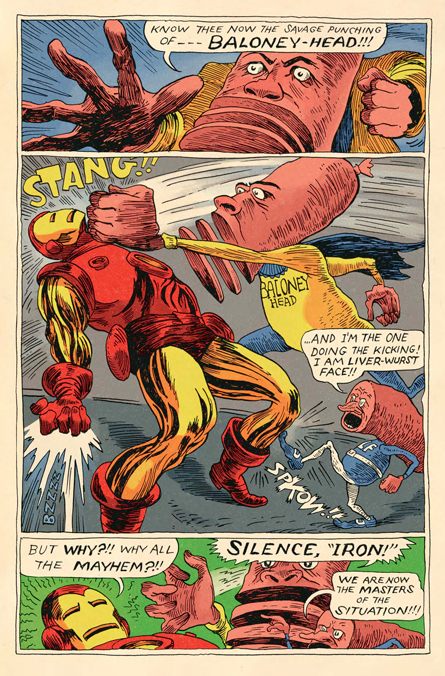Comics /
Spotlight /
Knowledge and Scholarship
Philosophy and Comic Books
By Hervé St-Louis
October 13, 2009 - 23:50
My editors say that my latest articles are too complicated. To quote one of them, “I cringe when I read your articles. You start nicely with concepts the average reader can relate to. At one point, you take off like a plane. I understand you, but I know that you’ve lost most people.”
Hum, sorry ‘bout that Mr. Editor. I’ve written a lot about comic book creators recently challenging the status quo. For every blogger that calls me an idiot, another emails and tells me that although he doesn’t always agree with me, that at least I make him think and that I’m thought provoking.
I’ve been thinking a lot about methodology and historiography recently. For example, I never liked what comic book historian R.C. Harvey wrote about comic books, especially the
word and picture school he promoted. I prefer Scott McCloud’s theory on comic books although I think he didn’t go far enough. But that was last year.
This year, I’m attacking other topics. Contesting the place of the comic book creator in the comic book universe has shown me that it’s like a western movie film set with cardboard storefronts. If you elbow a prop, it falls. The set appears to be anchored but it’s not. Classic question. How do we know what we think we know about comic books? We trust we’ve read for years.
There’s been research on comic books, but most is from non scholarly secondary sources. What were the primary sources of the writers that wrote the secondary sources? Can their investigative work be replicated? I never questioned books written on the history of comic books before. I disagree with R.C. Harvey on what comic books are. Yet, I’ve accepted his work on the history of comic books. I should worry about his biases not because he is a bad writer, but because his viewpoint colours everything he writes. To verify his work as an historian, the first step is to replicate his investigation. I can ask the same questions to the people he interviewed. But how the question was framed influenced the answer given unless following a rigorous methodological approach that cancels data tainting biases. But replicating his interviews will be difficult because most of the primary sources are dead people.
I’ve ask questions about comic book creators recently. I could’ve questioned comic book publishers, retailers, or distributors like Diamond Comics. A lot of established notions about comic books need to be challenged. Asking questions is not always easy. It’s easy to attack the guy asking the questions no one wants to ask, instead of asking why no one asked before. But I’m a free thinker and the publisher of
The Comic Book bin. It is the only major media on comic books in North America free of outside influences. That’s why I can ask the questions no one will.
Readers beware. I will challenge several pillars of the comic book world. If my recent articles on copyrights and comic book creators annoyed you, please leave. I’m on a quest for knowledge. I have to break a lot of ideas first. If this is not for you, stick to my reviews.
Comic Book Bin writers are above average writers. Follow them instead.
Comic books are changing (another notion worth challenging), but before predicting the change (or lack of), where are they coming from? What has been written about comic books insufficient. There are many taboos and stories that need to be told. This type of investigation is not for everyone. There are bloggers that can comfort you and continue to reaffirm what you believe about comic books. But if you want to be engaged, stick around.
Borrowing from art history and critical theory to study comic books is sensible, but I’m not an art historian. A clear reliable methodology is more important. Asking about the method of inquiry for studying comic books benefits all.
Here are my beliefs and biases
1-I love comic books. Seems trivial but necessary to spell out.
2-The business side and the artistic side of comic books are equally important.
3-The reader is more than a customer. His interaction with a comic book is half of the comic book equation. The other half is making comic books. Studying comic books without studying the reader is a mistake.
By listing my beliefs and biases above, I can use them to study comic books. It’s a different approach from how comic books have been studied thus far that can lead to original findings.
Last Updated: January 17, 2025 - 08:20
